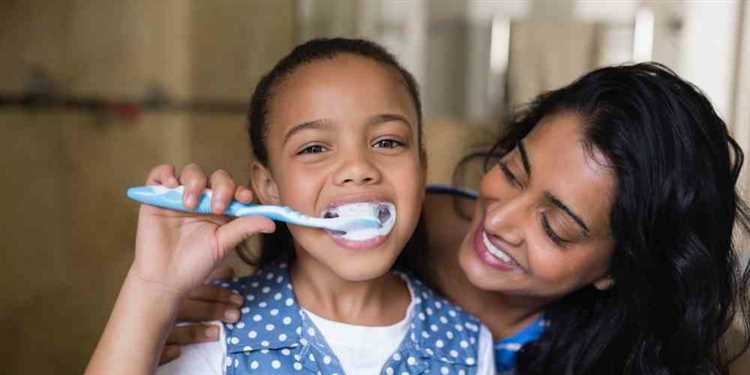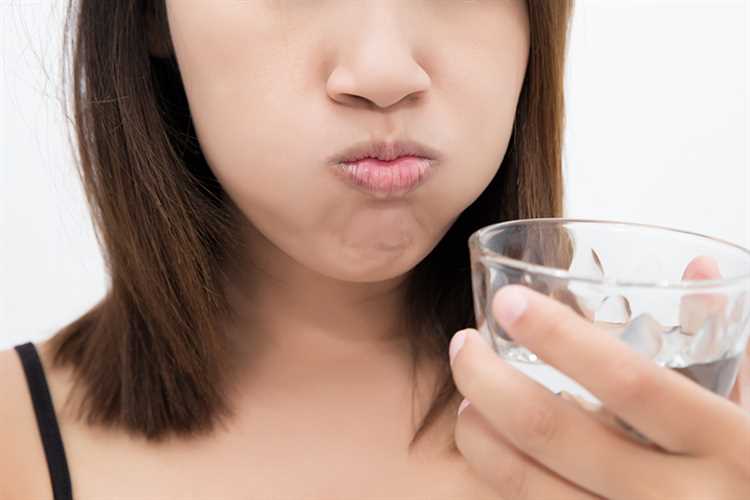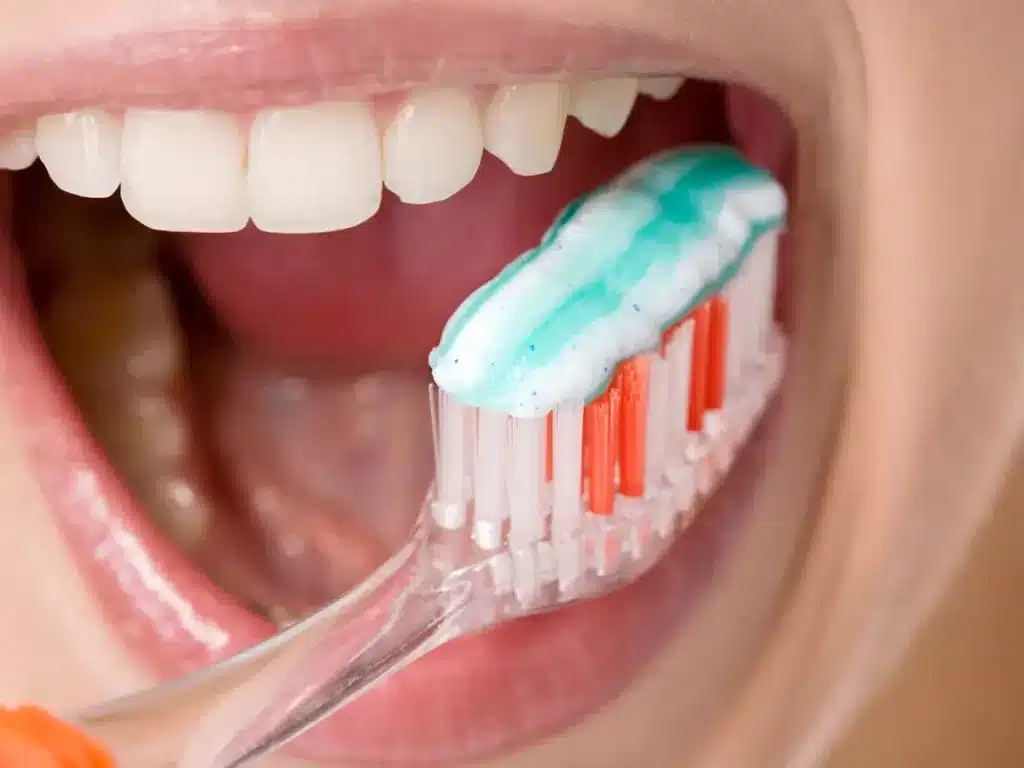
Brushing your teeth twice a day is a vital part of maintaining good oral hygiene. However, many people are unaware that rinsing your mouth with water immediately after brushing can diminish the effectiveness of your toothpaste. It may seem counterintuitive, but not rinsing your toothpaste after brushing can actually benefit your dental health in several ways.
When you brush your teeth, you apply toothpaste that contains fluoride, a key ingredient in preventing tooth decay. Fluoride works by strengthening the enamel, making it more resistant to acid attacks from bacteria and sugary foods. By not rinsing your toothpaste, you allow the fluoride to remain on your teeth longer, increasing its effectiveness in protecting your teeth.
Another benefit of not rinsing toothpaste is that it allows the active ingredients to continue working after brushing. Most toothpaste contains ingredients such as triclosan, which fights against gum disease, and calcium phosphate, which helps to remineralize the teeth. By leaving these ingredients on your teeth, they can continue to work and provide long-lasting protection even after you finish brushing.
Moreover, not rinsing toothpaste can also help to reduce tooth sensitivity. Many toothpaste brands offer sensitivity relief formulas that contain desensitizing agents. These agents work by blocking the channels in the teeth that transmit pain. By leaving the toothpaste on your teeth, you increase the contact time between the desensitizing agents and your teeth, which can provide greater relief from tooth sensitivity.
In conclusion, not rinsing toothpaste after brushing can have significant benefits for your dental health. By allowing the fluoride and other active ingredients to remain on your teeth, you enhance their effectiveness in protecting against tooth decay, gum disease, and tooth sensitivity. So next time you brush your teeth, remember to skip the rinse and enjoy the full benefits of your toothpaste!
- The Harmful Effects of Rinsing Toothpaste
- Harm to Tooth Enamel
- The Dangers of Acidic Beverages
- The Importance of Professional Advice
- Reduced Fluoride Protection
- Promotes Tooth Decay
- The Role of Fluoride
- The Effects of Rinsing
- Benefits of Not Rinsing Toothpaste
- Increased Fluoride Absorption
- Protection Against Cavities
- Improved Oral Health
- 1. Enhanced fluoride protection
- 2. Extended antibacterial effect
- 3. Improved tartar control
- 4. Long-lasting freshness
- Question-Answer:
- Why is it important not to rinse toothpaste?
- Can rinsing after using toothpaste cause tooth decay?
- What is the recommended amount of fluoride in toothpaste?
- How long should I wait to rinse after using toothpaste?
The Harmful Effects of Rinsing Toothpaste
Rinsing toothpaste may seem like a harmless step in your oral hygiene routine, but it can actually have some detrimental effects on your dental health. Here are some of the reasons why you should avoid rinsing toothpaste immediately after brushing:
1. Reduced fluoride effectiveness:
Fluoride is a key ingredient in toothpaste that helps strengthen tooth enamel and protect against tooth decay. However, when you rinse your mouth with water after brushing, you wash away the fluoride before it has a chance to take full effect. This can significantly decrease its effectiveness in preventing cavities and other dental issues.
2. Unsatisfactory mineralization:
Rinsing toothpaste can disturb the remineralization process that occurs after brushing. When you brush your teeth, the toothpaste leaves behind a residual layer on your teeth that contains important minerals like calcium and phosphate. These minerals help replenish the minerals lost during the demineralization process caused by acid-producing bacteria. By rinsing immediately after brushing, you wash away these beneficial minerals, hindering the remineralization process.
3. Wasted effort and cost:
Not rinsing after brushing allows the toothpaste to remain in contact with your teeth for a longer period of time, maximizing its effectiveness. Rinsing prematurely not only reduces the efficacy of the toothpaste but also wastes the efforts and money spent on purchasing and using it. To get the most out of your toothpaste, it’s best to avoid rinsing it away immediately after brushing.
4. Increased risk of tooth sensitivity:
Rinsing toothpaste can lead to increased tooth sensitivity, especially if you’re using a toothpaste specifically designed for sensitivity. These toothpastes contain ingredients that help build a protective barrier on the teeth to reduce sensitivity. When you rinse with water, you remove this protective barrier and leave your teeth exposed to sensitivity triggers like hot, cold, or sweet foods and beverages.
5. Missed opportunity for optimal cleanliness:
By not rinsing toothpaste, you give the active ingredients more time to work on your teeth and gums. This can lead to a cleaner and fresher mouth, as the toothpaste can effectively fight bacteria, plaque, and bad breath. Rinsing prematurely after brushing can prevent these benefits from being fully realized.
In conclusion, while rinsing toothpaste may seem like a harmless and instinctive step, it can actually have negative consequences for your dental health. By avoiding rinsing immediately after brushing, you can maximize the benefits of toothpaste and enjoy a healthier smile.
Harm to Tooth Enamel
The enamel is the hard outer layer that protects the teeth from decay and sensitivity. When toothpaste contains fluoride, it helps remineralize and strengthen the enamel. However, rinsing the toothpaste immediately after brushing can limit its effectiveness and increase the risk of enamel damage.
When you rinse your mouth with water after brushing, you wash away the fluoride left on the teeth, decreasing its ability to protect against cavities. Fluoride works by forming a protective layer on the enamel, making it more resistant to acid attacks from plaque and bacteria. By not rinsing, you allow the fluoride to continue working for an extended period, providing long-lasting protection.
The Dangers of Acidic Beverages
Rinsing toothpaste and exposing your teeth to acidic beverages shortly afterward can be particularly harmful to the enamel. Acidic drinks such as citrus juices, sodas, and energy drinks can soften the enamel, making it more vulnerable to erosion. The combination of acid and brushing can accelerate the enamel’s erosion process, leading to tooth sensitivity and cavities.
If you brush your teeth and then consume acidic beverages, it is essential to wait at least 30 minutes before rinsing or drinking anything. This allows the fluoride to strengthen the enamel and form a protective barrier.
The Importance of Professional Advice
To ensure you maintain optimal oral health and protect your tooth enamel, it is best to consult with a dental professional. They can evaluate your oral health and provide personalized advice on the proper brushing technique, frequency of brushing, and the type of toothpaste that best suits your needs.
Remember, prevention is key in maintaining a healthy smile. By understanding the importance of not rinsing toothpaste and following the guidance of dental professionals, you can keep your enamel strong and protect your teeth for years to come.
Reduced Fluoride Protection
Rinsing your mouth after brushing your teeth with toothpaste can reduce the fluoride protection provided by the toothpaste. Fluoride is an essential mineral that helps to prevent tooth decay and strengthen tooth enamel. When you rinse your mouth with water or mouthwash after brushing, you wash away the concentrated fluoride from the toothpaste that has been left on your teeth.
Fluoride works by remineralizing tooth enamel and making it more resistant to acid attacks. It also helps to inhibit the growth of bacteria that can cause tooth decay. By not rinsing your mouth after brushing with fluoride toothpaste, you allow the fluoride to remain on your teeth for a longer period of time, maximizing its protective effects.
Research has shown that rinsing with water immediately after brushing can reduce the availability of fluoride in the oral cavity by up to 70%. Mouthwash containing alcohol can be particularly harmful, as it has been found to reduce the uptake of fluoride by half or more.
It is important to note that if you choose to use a mouthwash after brushing, it is best to wait at least 30 minutes before rinsing. This allows the fluoride to fully penetrate the enamel and provide maximum protection.
To maximize the benefits of fluoride, it is recommended to spit out excess toothpaste after brushing and refrain from rinsing your mouth with water or mouthwash. This allows the fluoride to remain on your teeth and provide continued protection against tooth decay and enamel erosion.
Promotes Tooth Decay

Rinsing your mouth with water after brushing your teeth may seem like a good idea, but it can actually promote tooth decay. When you rinse your mouth with water immediately after brushing, you wash away the protective layer of fluoride left behind by the toothpaste. Fluoride is an essential mineral that helps to strengthen and protect your teeth against tooth decay.
By not rinsing your mouth after brushing, you allow the residual fluoride from the toothpaste to remain on your teeth and continue working its magic. This helps to protect your teeth from acid attacks and plaque buildup, which are the main culprits in tooth decay.
The Role of Fluoride
Fluoride is a natural mineral that can be found in water sources and many toothpastes. It works by remineralizing the enamel of your teeth, making it stronger and more resistant to decay. When you brush your teeth with fluoridated toothpaste, the fluoride molecules bind to the surface of your teeth and create a protective shield.
This shield helps to prevent the demineralization of your enamel, which is the process that leads to tooth decay. It also promotes the remineralization of enamel, which can reverse the early stages of tooth decay before it turns into a cavity.
The Effects of Rinsing
Rinsing your mouth with water after brushing washes away the fluoride from the toothpaste and undermines its protective effects. This leaves your teeth vulnerable to acid attacks from foods and beverages, and increases the likelihood of plaque formation.
To maximize the benefits of fluoride, it is recommended to avoid rinsing your mouth with water or any other liquids for at least 30 minutes after brushing. This allows the fluoride to penetrate your teeth and provide long-lasting protection against tooth decay.
So remember, the next time you brush your teeth, resist the urge to rinse and reap the benefits of a stronger, healthier smile!
Benefits of Not Rinsing Toothpaste

Not rinsing toothpaste after brushing your teeth can provide several benefits to your oral health. Here are some of the advantages of adopting this habit:
1. Longer-lasting fluoride protection: Toothpaste generally contains fluoride, a mineral that helps prevent tooth decay and strengthens tooth enamel. When you don’t rinse your mouth after brushing, you allow the fluoride in the toothpaste to stay on your teeth for a longer period, providing extended protection against cavities.
2. Enhanced remineralization: Remineralization is the process of restoring minerals to the tooth enamel that have been lost due to acid attacks. By not rinsing toothpaste, you give the remineralizing agents in the toothpaste more time to work, which can help in strengthening and repairing the enamel.
3. Improved sensitivity relief: Many toothpaste brands are formulated to provide relief from tooth sensitivity. When you leave toothpaste on your teeth after brushing, the ingredients aimed at reducing sensitivity can have a longer-lasting effect, providing greater relief and comfort.
4. Better plaque control: Not rinsing toothpaste can improve plaque control. While brushing, the toothpaste helps to loosen and remove plaque buildup on your teeth. Allowing the toothpaste residue to remain on your teeth for some time can enhance the effectiveness of this process.
5. Cost-effectiveness: Skipping the rinse step can help you maximize the value of your toothpaste. By not rinsing, you use less water and save on toothpaste, which can lead to long-term cost savings.
6. Increased convenience: Not rinsing toothpaste can make your oral hygiene routine quicker and more convenient. You simply brush your teeth, spit out the excess toothpaste, and you’re done. There’s no need to spend extra time rinsing your mouth, making this habit ideal for individuals with busy lifestyles.
While not rinsing toothpaste can offer these benefits, it’s important to remember that it’s essential to spit out the toothpaste after brushing to avoid ingesting excessive fluoride. Additionally, it’s advisable to consult your dentist for personalized oral hygiene recommendations that suit your specific needs.
Increased Fluoride Absorption
One important reason why you should not rinse your toothpaste after brushing is because it can lead to increased fluoride absorption. Fluoride is a mineral that is added to toothpaste to help strengthen the enamel of your teeth and prevent tooth decay.
When you brush your teeth with toothpaste, the fluoride in the toothpaste coats your teeth and forms a protective layer. This layer helps to prevent the formation of cavities and protects your teeth from acid attacks. However, if you rinse your mouth with water immediately after brushing, you may wash away this protective layer and reduce the effectiveness of the fluoride.
By not rinsing your toothpaste after brushing, you allow the fluoride to remain on your teeth for a longer period of time. This gives the fluoride more time to be absorbed into the enamel of your teeth, making them stronger and more resistant to decay.
It’s important to note that while fluoride is beneficial for dental health, it can be harmful if ingested in large amounts. That’s why it’s important to use the right amount of toothpaste (a pea-sized amount for children and a pea-sized to a smear-sized amount for adults) and to avoid swallowing toothpaste. If you’re concerned about fluoride absorption or have specific dental concerns, it’s always a good idea to consult with your dentist.
So remember, next time you brush your teeth, resist the urge to rinse your toothpaste. By allowing the fluoride to remain on your teeth, you can maximize its benefits and help keep your teeth strong and healthy.
Protection Against Cavities
Toothpaste plays a crucial role in protecting against cavities. Cavities, also known as dental caries, are caused by the demineralization of tooth enamel, which occurs when bacteria in the mouth produce acids that eat away at the enamel.
When you brush your teeth with toothpaste that contains fluoride, you are providing your teeth with an extra layer of protection. Fluoride helps to strengthen the tooth enamel and make it more resistant to acid attacks from bacteria. It can also reverse early signs of tooth decay and prevent the growth of plaque, which is a sticky film of bacteria that can contribute to the formation of cavities.
Rinsing your mouth with water after brushing may wash away the fluoride from the toothpaste, reducing its effectiveness. Leaving a thin layer of toothpaste on your teeth can help to ensure that the fluoride remains in contact with the enamel, providing ongoing protection against cavities.
It is important to note that while toothpaste is a valuable tool for preventing cavities, it is not a substitute for proper dental hygiene. Brushing your teeth twice a day, flossing regularly, and visiting your dentist for check-ups are essential for maintaining good oral health and preventing cavities.
So, remember to brush your teeth with fluoride toothpaste and avoid rinsing afterwards to maximize the protection against cavities and keep your smile healthy and beautiful!
Improved Oral Health
Optimal oral health is a key factor in maintaining overall well-being. By not rinsing toothpaste after brushing, you can significantly improve your oral health in several ways:
1. Enhanced fluoride protection
Toothpaste contains fluoride, a mineral that helps strengthen tooth enamel and prevent tooth decay. By leaving the toothpaste residue in your mouth after brushing, you allow the fluoride to continue working and provide long-lasting protection against cavities.
2. Extended antibacterial effect
Many toothpastes contain antibacterial agents that help fight harmful oral bacteria. By not rinsing after brushing, you extend the contact time between the toothpaste and your teeth, enhancing its antibacterial effect. This can help reduce the risk of gum disease and bad breath.
3. Improved tartar control
Tartar, or dental calculus, is a hard deposit that forms on teeth as a result of plaque buildup. Toothpaste contains ingredients that help prevent tartar formation. When you don’t rinse your mouth after brushing, the residual toothpaste can continue working to inhibit tartar formation, leading to improved oral hygiene.
4. Long-lasting freshness
Many toothpastes are flavored to provide a fresh and clean feeling in the mouth. By not rinsing after brushing, you allow the residual toothpaste to contribute to a longer-lasting feeling of freshness, helping to maintain fresh breath throughout the day.
Overall, not rinsing toothpaste after brushing can help ensure better oral health by maximizing the benefits of fluoride, enhancing the antibacterial effect, improving tartar control, and maintaining long-lasting freshness.
Question-Answer:
Why is it important not to rinse toothpaste?
Rinsing after brushing removes the protective layer of fluoride left on your teeth by the toothpaste. This fluoride helps to strengthen your teeth and protect against tooth decay.
Can rinsing after using toothpaste cause tooth decay?
Yes, rinsing immediately after using toothpaste can potentially increase your risk of tooth decay. When you rinse, you wash away the fluoride that helps to protect your teeth.
What is the recommended amount of fluoride in toothpaste?
The recommended amount of fluoride in toothpaste is 1000 to 1500 parts per million (ppm). This concentration is considered safe and effective for preventing tooth decay.
How long should I wait to rinse after using toothpaste?
It is recommended to wait at least 30 minutes after brushing before rinsing with water. This allows the fluoride in the toothpaste to fully work and provide maximum protection for your teeth.